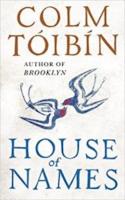
Viking (2017) h/b 262pp £14.99 (ISBN 9781501140211)
Sometimes an imaginative recreation of a masterpiece can do things a translation cannot. Christopher Logue’s War Music isn’t Homer, but it makes you think. Like Logue, T. has read his sources (the Orestes story in the tragic canon) in translation. He keeps the main characters’ names, but unlike Logue places his narrative squarely in an imagined past, filling in gaps and leaving the familiar story at important points to make the story his own. The sacrifice, return and murder are there, Electra broods over her father’s tomb, and Orestes comes back to exact vengeance, though with a difference.
T.’s version is less an examination of motive and responsibility than a portrait of three people (Clytemnestra, Orestes, Electra) trying to make sense of a world in which they seem to have little control over their actions. Orestes—whose story is told in the third person, whereas the other two tell their own—isn’t sent away to kindly Strophius of Phocis, but is kidnapped by sinister palace guards and imprisoned in a kind of grim boarding school along with the sons of prominent Argive elders. He escapes with two others, and after tough and violent adventures they live a kind of hard idyll on an old woman’s farm on the remote edge of the country. Back home, Electra nurses hatred for her mother, who divides her time with Aegisthus between bed and governing an uneasy country, always seemingly on the edge of rebellion. Orestes and the Pylades figure (here called Leander, older and more decisive) eventually make their secret way back and Orestes kills his mother with a knife supplied by Electra, in an act bordering on the casual. There are no Furies, and no Areopagus trial. Leander leads a successful uprising against Aegisthus, but now rules Argos along with him. Orestes, shunned because of his matricide, is increasingly sidelined. After many deaths the novel ends with a birth, to Orestes’ new bride Ianthe. The very last paragraph hints at signs of a fresh dawn, but the persistent dark menace of all that has gone before is not easily dispelled.
Of the three main characters’ stories, Orestes’ exile is the most gripping: a boy’s painful growth into early manhood and frustration. He relies heavily on his friend and mentor Leander, but never really understands him. In fact, no one in the book really understands anyone else. As in T.’s previous novels, questions are left unanswered, even between friends; everyone seems to be surrounded by a cloud of unknowing. People speak only in whispers: what is going on, who is in charge, whose side are you really on? Over everything looms the shadowy, intimidating presence of the palace, with its corridors and dungeons and meetings taking place somewhere else, almost a character in itself. Ghosts of the recent dead wander its passages. Every corner is watched by guards, who are watched by more guards. Inconvenient families are wiped out; the house belonging to one such simply disappears overnight. Aegisthus, early a sinister and brutal presence, gradually lets slip his hold on power to Clytemnestra, revealed as the sole instigator of Orestes’ imprisonment and the Argive elders’ executions. Electra, despite her implacable hatred, comes to resemble her mother. To be sure, there are occasional backward glimpses of a life of greater certainty, typified by Orestes’ and Leander’s simple country sojourn. And things may perhaps get better, though even that prospect is touched with ambiguity:
‘We live in a strange time,’ Electra said. ‘A time when the gods are fading. Some of us still see them but there are times when we don’t. Their power is waning. Soon, it will be a different world. It will be ruled by the light of day. Soon it will be a world barely worth inhabiting. You should feel lucky that you were touched by the old world, that in that house it brushed you with its wings.’
The tale is told in T.’s inimitable flat, unadorned prose. The only weakness is in Clytemnestra’s early story, where a close reminiscence of Euripides’ Iphigeneia at Aulis strikes a false note. Otherwise main clauses pursue each other with an almost hypnotic effect. There is no escape. That is how things are.
Anyone interested in Greek literature should read this unsettling novel, if only to confirm the enduring power of Greek writers to provoke new invention.
Anthony Verity
